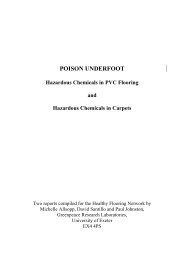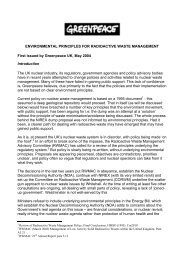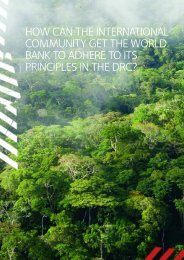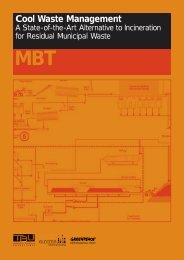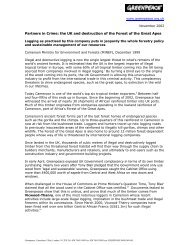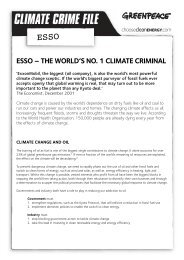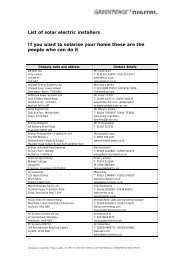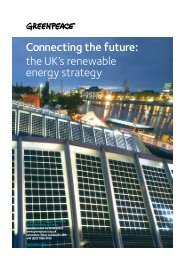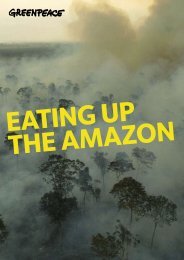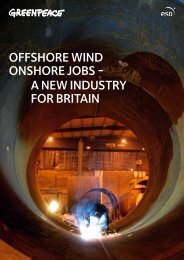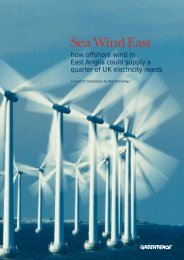How Sinar Mas is Pulping the Planet - Greenpeace
How Sinar Mas is Pulping the Planet - Greenpeace
How Sinar Mas is Pulping the Planet - Greenpeace
You also want an ePaper? Increase the reach of your titles
YUMPU automatically turns print PDFs into web optimized ePapers that Google loves.
28<br />
Will SINAr MAS SUPPort<br />
<strong>the</strong> IMMeDIAte protection<br />
of ALL peatLANDS AND a<br />
moratorIUM on forest<br />
clearANce?<br />
“Peatlands contribute almost<br />
50 percent of Indonesia’s GHG<br />
em<strong>is</strong>sions, yet development in<br />
peatlands probably contributes<br />
to less than 1 percent to <strong>the</strong><br />
national economy.”<br />
Indonesian National Development<br />
Planning Agency, Bapanas (2009)<br />
“Em<strong>is</strong>sions from peatland<br />
are expected to increase<br />
by 20 percent, reaching<br />
1.2 Gt CO2e in 2030 through<br />
<strong>the</strong> continued conversion<br />
of peatland.”<br />
Indonesian National Climate<br />
Change Council (2008b)<br />
In a letter to <strong>Greenpeace</strong> International<br />
in January 2010, 294 APP claims that it<br />
“supports President Susilo Bambang<br />
Yudhoyono’s pledge to reduce carbon<br />
em<strong>is</strong>sions by 26% by 2020 [and <strong>is</strong>]<br />
committed to making its carbon footprint<br />
as small as possible.”<br />
In September 2009, Indonesian President<br />
Susilo Bambang Yudhoyono announced<br />
its climate change targets to G-20 leaders,<br />
stating that Indonesia will: 295<br />
“reduce [its GHG] em<strong>is</strong>sions by 26% by<br />
2020 from BAU (Business As Usual). With<br />
international support, we are confident that<br />
we can reduce em<strong>is</strong>sions by as much as<br />
41%. Th<strong>is</strong> target <strong>is</strong> entirely achievable<br />
because most of our em<strong>is</strong>sions come<br />
from forest-related <strong>is</strong>sues, such<br />
as forest fires and deforestation.”<br />
(emphas<strong>is</strong> added by <strong>Greenpeace</strong>)<br />
President Yudhoyono’s targets could lead<br />
to substantial reductions in Indonesia’s<br />
GHG em<strong>is</strong>sions: 296<br />
26 per cent target: predicted 2020<br />
em<strong>is</strong>sions would need to be cut to<br />
around 90 per cent of Indonesia’s 2005<br />
em<strong>is</strong>sions (i.e. equivalent to a reduction<br />
of 163MtCO 2<br />
on 2005 annual em<strong>is</strong>sions).<br />
41 per cent target: predicted 2020<br />
em<strong>is</strong>sions would need to be cut to<br />
nearly 75 per cent of Indonesia’s 2005<br />
em<strong>is</strong>sions (i.e. equivalent to a reduction<br />
of 586MtCO 2<br />
on 2005 annual em<strong>is</strong>sions).<br />
As 80 per cent of Indonesia’s<br />
GHG em<strong>is</strong>sions are mostly from<br />
<strong>the</strong> conversion of rainforests and<br />
peatlands, 297 <strong>the</strong>se “forest-related”<br />
em<strong>is</strong>sions would have to be severely cut<br />
in order to meet President Yudhoyono’s<br />
targets as described above. 298<br />
In May 2010, as a first step to achieving its<br />
targets, President Yudhoyono announced<br />
a two year moratorium on <strong>the</strong> granting<br />
of any “new concessions on conversion<br />
of natural forests and peatlands into<br />
plantations”. 299 Th<strong>is</strong> was part of a USD<br />
1 billion ‘cooperation agreement’<br />
between <strong>the</strong> Norwegian and Indonesian<br />
Governments. 300<br />
The moratorium does not apply to<br />
<strong>the</strong> conversion of natural forests and<br />
peatlands within ex<strong>is</strong>ting concessions,<br />
so does not affect <strong>the</strong> hundreds of<br />
thousands of hectares of forested<br />
concessions that <strong>Sinar</strong> <strong>Mas</strong> has<br />
already acquired but which have not<br />
yet been converted. Th<strong>is</strong> includes<br />
<strong>the</strong> forested concessions that <strong>Sinar</strong><br />
<strong>Mas</strong> controls for both pulp and oil<br />
palm plantations. 301<br />
Of <strong>the</strong> pulpwood concessions <strong>Sinar</strong> <strong>Mas</strong><br />
acquired since 2007, around 30,000<br />
hectares are located on peatland areas<br />
over three metres deep, and <strong>the</strong>refore<br />
illegal to destroy, and over 100,000<br />
hectares are located on peatland less<br />
than three metres deep. 302<br />
APP <strong>is</strong> continuing to expand its pulp<br />
and palm oil operations into Indonesia’s<br />
remaining rainforests and carbon-rich<br />
peatlands. At <strong>the</strong> same time, annual<br />
em<strong>is</strong>sions from peatlands are forecast<br />
to increase by 20 per cent due to <strong>the</strong><br />
“continued conversion of peatland.” 303<br />
It <strong>is</strong> <strong>the</strong>refore clear that if APP continues<br />
business as usual it will undermine<br />
<strong>the</strong> government’s aims to reduce its<br />
contribution to global climate change.



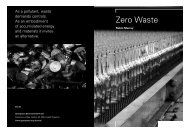
![[2007] EWHC 311 - Greenpeace UK](https://img.yumpu.com/22079793/1/184x260/2007-ewhc-311-greenpeace-uk.jpg?quality=85)
